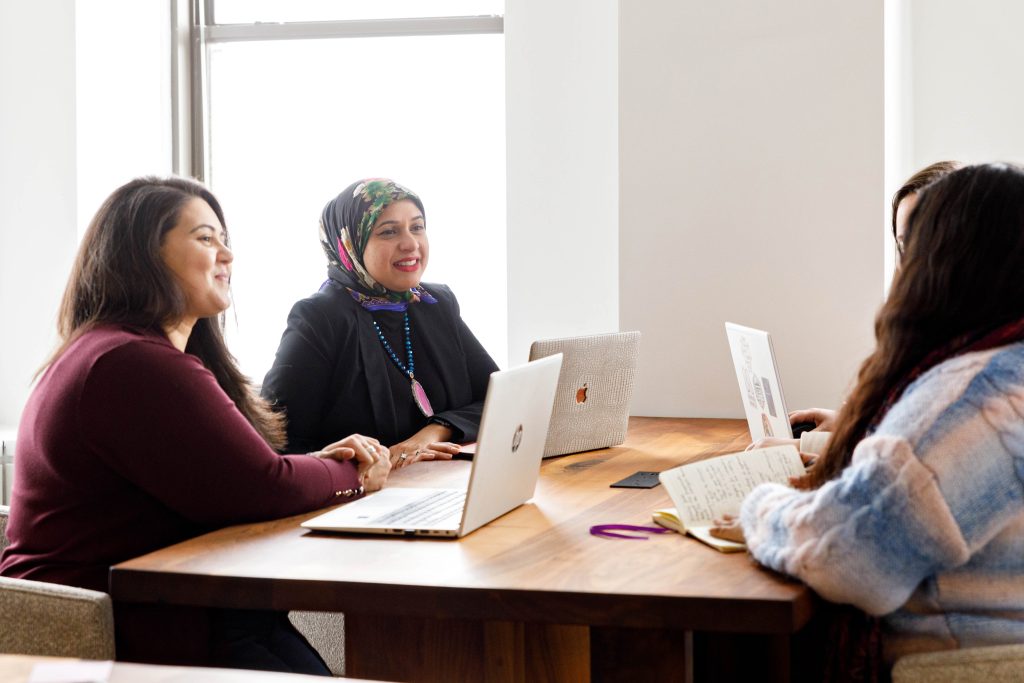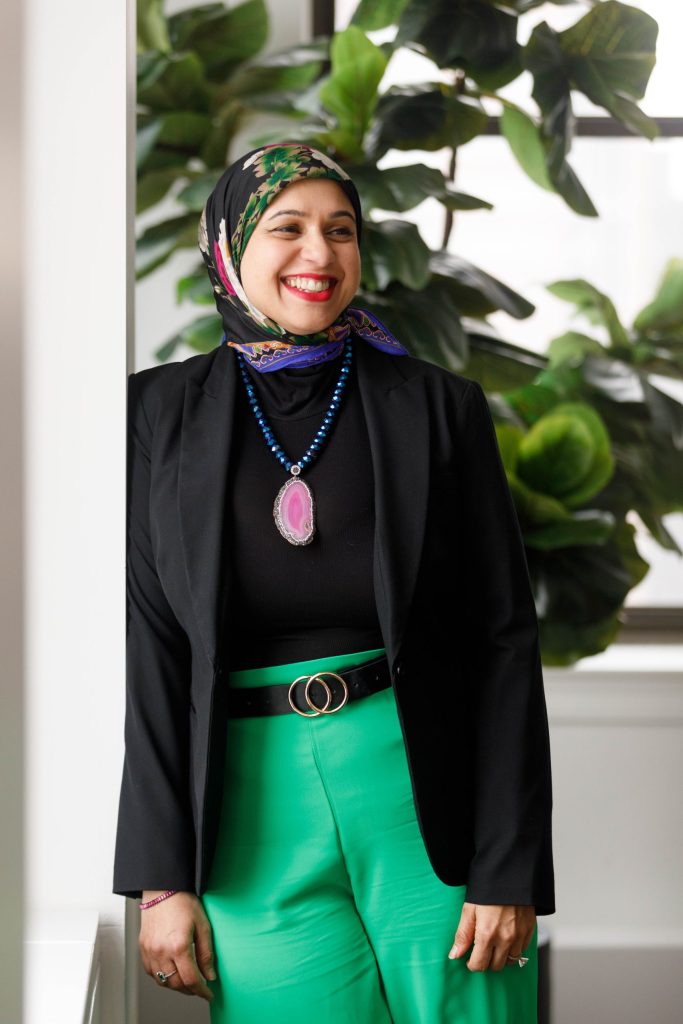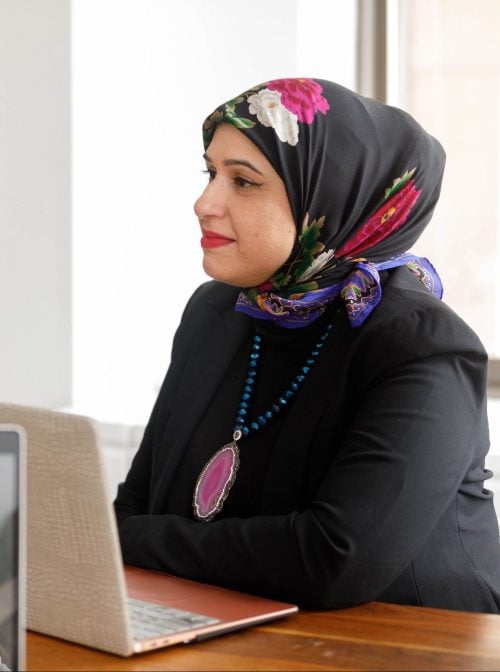Reema Kamran serves as an inspiration to many in her life. She’s the co-founder of Muslim Civic Coalition, a five-year-old nonprofit organization that focuses on civic justice for Muslim Americans, and she’s a community leader, an advocate, an ally, and a mother of four sons she wants to build a better future for.
But what inspires Kamran to be a leader?
“My Islamic faith plays a central role in my life, and it guides me,” says Kamran. “My faith continues to inspire me to be a good neighbor by fighting for justice and equity for all.”

Kamran moved to the U.S. 25 years ago from Canada with her husband. She settled in Elmhurst, Illinois, and studied economics and business studies at Elmhurst College, where she began trying to find her own community. As a young, married, visibly Muslim Asian American and Pacific Islander (AAPI) woman, she often found herself in spaces where she didn’t feel like she belonged.
“I had no roots here; it was a really lonely journey,” says Kamran. “It is incredibly lonely to be in a space where you’re always the ‘other.’ Even though I went to a wonderful college, it was a small college, and I didn’t feel like I belonged in all the spaces.”
When Kamran didn’t find a space for herself, she chose to create her own. She co-created a spiritual life council on campus for students from diverse faiths who were also looking for a sense of belonging. It became a home for different dialogues, a space to talk about faith, the day-to-day stressors of college life, and the evolving sociopolitical climate students found themselves in.
“I wanted to find other people who were struggling with similar experiences and create a space for belonging together.” says Kamran. “There is so much power in coming together, whether to talk about faith, or race, or whatever else is important to us. There is more power in the collective effort than the individual effort.”
Two decades later, Kamran continues to create spaces for the Muslim American community and other underrepresented communities by advocating for their rights and fighting for their justice.
In conversation with Interfaith America Magazine, Kamran shares about her work, what it means to be a Muslim AAPI leader and discusses how different communities can come together to build a better future.
Silma Suba: How would you describe the Asian American and Pacific Islander community?
Reema Kamran: The AAPI community is incredibly diverse and complex. We can trace our origins from about 50 ethnic groups from 40 countries and speak 100 languages, so we have commonalities but also have our unique struggles.
The AAPI community is also very diverse in terms of immigration history, socioeconomic status, religion and other factors. Some members of the AAPI community are immigrants or children of immigrants, while others are multi-generational Americans. Some members have a high income, while others live under the poverty line. We have members of our community that are well educated and hold graduate degrees, while others may have completed high school certificates. The community is united by shared experiences, and have for many years fought together against discrimination, racism, and other forms of marginalization.
SS: What’s an interfaith encounter that had a significant impact in your life?
RK: I’ve been very fortunate to work with like-minded individuals and community leaders from across faith traditions. From forming a multifaith coalition when I was in college to working together with partners and allies to put two bills to the state legislature that focused on education equity, I have worked with incredible people from across faiths.
So, when I think about what makes these encounters meaningful or significant, I think it’s because they are positive, and they are impactful. They require coalition building and building community where we can collectively make an impact versus doing things individually.
For example, in recent years, at the Muslim Civic Coalition we worked with over 100 cross-cultural, cross-racial, cross-faith partners to work on the census. We wanted to make sure that people of color and AAPI community members, including the hard-to-count community members, were counted. That they understood about the census and felt safe talking to census workers.
In 2021, we passed the athletic attire bill, which says that those that are playing athletic sports can change their uniform based on faith, based on comfort, and based on health. This bill became a law with the support of the Jewish community, the Hindu community, as well as many other communities who are all working towards better education and equity for children in schools. Working with people from diverse communities is what makes the work so inspiring and impactful.

SS: Do you see your American Muslim experience reflected in conversations around America’s religious diversity?
RK: As an American Muslim, I’m always struggling with my identity that incorporates the values and tenets of my faith along with the American identity, even though they don’t have to be opposing, they’re considered to be.
American Muslims are one of the largest growing minorities in America, yet Muslim individuals are often underrepresented in the mainstream narrative or represented negatively in the media. But, despite facing discrimination and marginalization, I’m proud to see that there is a change coming. We are seeing more representation in all the different arenas of life, like someone who looks like me is being reflected in sports, in the media, or on the silver screen. I think that is encouraging, because it shows that the impact of the work we’re doing, the community collaborations or the collective impact that we’re making, is actually making a difference. So, yeah, I see that the contributions are slowly being recognized.
SS: What led to the formation of the Muslim Civic Coalition?
RK: It started with a lot of conversations with friends and colleagues about changing the narrative around the Muslim American community. How do we create tangible change? How do we move the needle? We found that there was no civic organization that focuses on civic engagement for the American Muslim community.
So, when we were trying to think about how to be strategic in moving the needle or changing the narrative, we realized we had to focus on this specific thing. People were very insular, and they were working in silos. There wasn’t a lot of collaboration going on. So, the Muslim Civic Coalition was formed as an opportunity and a platform to collaborate outside the work that was already being done. Instead of starting from scratch and reinventing the wheel, we asked, who else is doing this work? How can we amplify and support this work with resources, strategy, advocacy, and other collective support?
We have six different initiatives that focus on civic engagement. We work in advocacy and policy, community engagement, and census and redistricting. We build capacity for our community by making sure we have the data and research to support the work that we are doing. Our organization was born with a very specific focus, and I think that has been a benefit, because we have actually been able to work very diligently on certain things and have been able to see success.
SS: What are some challenges you face in your work as a Muslim AAPI leader?
RK: I think that Islamophobia continues to be a challenge when you are talking to a group of people, and more than half of them report that they have faced religious discrimination. That is shocking, right? And not only them, but a third of Muslim school-going children talk about being bullied because of their faith. We’ve got to focus on that and question how we change this narrative so that we are not just pushing it under the rug and saying, “Oh, this happens all the time.” And we can do so by educating the community, by using interfaith curriculum, and by using opportunities to grow from it.
We are not a Muslim organization, we are a civic organization informed by our faith, and we serve everyone working towards civic equity and justice.
The other challenge we face is that we are a fairly young community in this work. We still need to fortify against our adversaries, gather our resources, make strategic decisions. The challenge is that it will take us some more time to make that change. But we have amazing mentorship from across the country that we look up to and work with. There are great mentors and great partners and allies within our work. Our work around political engagement, advocacy, and legislative affairs is not sexy work. It’s not well funded. When you work with an organization that is not Muslim per se but serves American Muslims and is informed by our faith, funding becomes a challenge, being recognized for our work becomes a challenge. Many of us who work in the nonprofit sector know that there is sometimes a hesitation to support our kind of work. It’s changing slowly. We have the ability to work with diverse organizations, often from underrepresented communities, and we’ve also made sure that we became one of the leaders in this space. We are here and we are doing the work and we want others to see us as a player in this civic effort.
SS: Are there challenges that you face from within the Muslim or AAPI communities?
RK: We’re all human and belonging to a minority group doesn’t make you immune to being bigoted against another minority. We have a lot of internal issues and baggage like internalized racism and mental health issues that go unheard, and these issues can stem from within a mosque, within our culture, our communities, and there is a challenge within our community to recognize that these issues are not just external.
One of the prevalent issues that comes to my mind is internalized racism. For many of our families, especially with the older generation, xenophobia and racism continue to exist even towards others within the AAPI community. There is an attitude or belief within some immigrant communities that we’ve been here longer and the ”others” are foreigners. I think that a lot of the older generation have internalized some of the harmful stereotypes that they heard about other communities, and it comes out in their interactions. My biggest concern is that when racism and bigotry go unchallenged, the whole society suffers. Because not only are these communities facing discrimination and marginalization outside their circle, but they’re also now dealing with it internally, too. It makes it difficult for us to work together towards a collective effort. And racism often gets passed from generation to generation, so we are not going to be able to break that cycle unless we have conversations.
SS: What efforts seem to be working to combat these challenges?
RK: I think in both my personal and professional spheres, I’ve always found that we can combat ignorance with engagement and education. We can do that by highlighting and understanding the many disparities that AAPI subgroups have. And those can be everything from housing, health, education, income and wealth. Unless we understand the challenges, and also the diversity that exists within these spheres, it is going to be really difficult to move towards equitable solutions.
Also collaborating within communities, amplifying our contributions, and then making sure that we’re changing the narrative from the beginning can be a part of other educational efforts. For example, investing in public education by investing in AAPI education. Like, in Illinois, we have the TEAACH Act that came into effect in 2021, which mandates that public schools must teach Asian American history. That was a multifaith, multiethnic effort that was led by the AAPI community, but it was supported by many others along the way, because there was this understanding that if we can start from the public school system then we can change the narrative from the beginning.
There is also the Muslim American curriculum bill, which requires that there is a conversation about the contributions of Muslim Americans in schools, and that it becomes a part of the curriculum. I think those are great examples of using education to combat ignorance.
As for engagement, we have to really focus on the importance of multiracial coalition building. There has already been amazing work done by the Black, Latinx, Indigenous communities, and AAPI organizations can work with them to strengthen the foundation that has been made. I think that’s a great way of building that coalition and aligning resources towards that collective effort to get to the end goal, which is justice and equity for all.
It’s important to remember that it takes a combination of different approaches to combat hate. It is never going to be just one solution.
READ THE SERIES
Exploring AAPI Experiences of Religious Identity and Diversity

This article is part of Interfaith America’s AAPI qualitative research and storytelling initiative, which explores Asian American and Pacific Islanders’ experiences of religious identity and diversity in the United States. Stories published as part of this initiative offer key findings from the research and spotlight AAPI changemakers across different religious, civic, and professional sectors.




